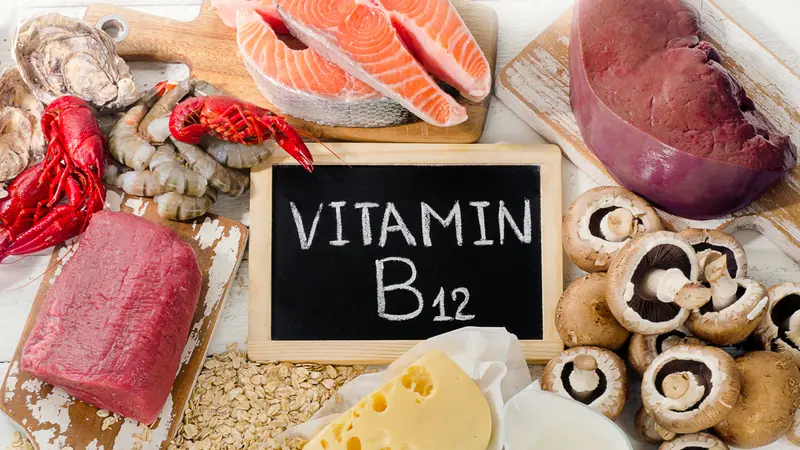

Food, Farming and Nutrition

Food, Farming and Nutrition
Vitamin B12: Why We Need It and Where We Can Get It
If you want to get more of vitamin B12, an essential vitamin, reach for the refrigerator! Unless you have a diagnosed vitamin or mineral deficiency, nutritional needs are best met with food—not supplements.
Why You Need Vitamin B12
Vitamin B12 is a water-soluble vitamin that aids in many essential bodily functions. It is absorbed in the stomach and then makes is way to your blood and cells, and any extra B12 is stored in your liver for future use.
Vitamin B12 is important for:
- Forming healthy red blood cells
- Functioning of your central nervous system
- Normal brain function
- Producing DNA
Symptoms of Vitamin B12 Deficiency
You may have a vitamin B12 deficiency if you’re experiencing any of the following symptoms:
- You’re more pale than usual or have jaundiced skin.
- You feel constantly fatigued/weak.
- You have “pins and needles” sensations in your hands and feet.
- You feel out of breath or dizzy.
- Your vision becomes blurry.
- You experience mood swings or personality changes.
If you don’t produce enough of a protein (intrinsic factor) that helps your body absorb vitamin B12, or if you don’t eat enough foods containing vitamin B12, you may develop a deficiency. Those who are at higher risk for developing a vitamin B12 deficiency include those who are over the age of 65, strict vegans, pregnant women, those who have had bowel-removal surgery, and those who take medication for diabetes or heartburn. If left untreated, B12 deficiency can lead to anemia, nerve damage, and other complications.
Foods High in Vitamin B12
Vitamin B12 is found in:
- Milk—Dairy and some non-dairy brands are fortified with vitamin B12.
- Fortified cereals—Some cereals are a good source of vitamin B12; just make sure to choose a cereal that is low in sugar and high in fiber and grains.
- Eggs—Yolks contain more vitamin B12 than egg whites, so it’s important to eat the whole egg. (If you have high cholesterol, check with your doctor or dietician first.)
- Yogurt—Full-fat plain yogurt or fat-free Greek yogurt both provide a solid amount of vitamin B12.
- Salmon—Just half of a cooked salmon filet (6oz.) contains more than 200% of the recommended dietary allowance (RDA) of vitamin B12.
- Tuna—Both canned and cooked tuna provide vitamin B12. For canned, opt for light tuna in water. For cooked tuna, note that the muscles right below the skin (the dark muscles) also contain a high concentration of vitamin B12.
- Beef—Eating 3oz. of red meat one to two times per week is recommended. Leaner meats contain higher vitamin levels, and grilling is preferable to frying.
- Liver and kidneys—Organ meats are rich in vitamin B12, but should be consumed in moderation, as they are high in cholesterol.
- Clams—A 3.5oz. serving of baby clams provides over 4,000% of the RDA of vitamin B12.
How Much Vitamin B12 Do You Need?
For males and females over the age of 19, the RDA for vitamin B12 is 2.4mcg. For pregnant or lactating women, the RDAs are 2.6mcg and 2.8mcg, respectfully.
For children, the RDAs are as follows:
- Birth to 6 months: 0.4mcg
- 7-12 months: 0.5mcg
- 1-3 years: 0.9mcg
- 4-8 years: 1.2mcg
- 9-13 years: 1.8mcg
- 14-18 years: 2.4mcg
Do I Need to Supplement with Vitamin B12?
Unless you have a vitamin B12 deficiency or have a risk factor for a deficiency, vitamin B12 is best obtained through food sources. While symptoms of excess B12 intake are rare since extra B12 is excreted through your urine, you could experience diarrhea, nausea, vomiting, and headache if you are taking vitamin B12 supplements in addition to vitamin-rich foods.
A simple blood panel will confirm your vitamin B12 levels, and you can develop a plan of action with your doctor to address a potential vitamin B12 deficiency.
REFERENCES
Cleveland Clinic. (2021, December 10). The best sources of vitamin B12. https://health.clevelandclinic.org/the-best-sources-of-vitamin-b12-infographic/


 By
By







